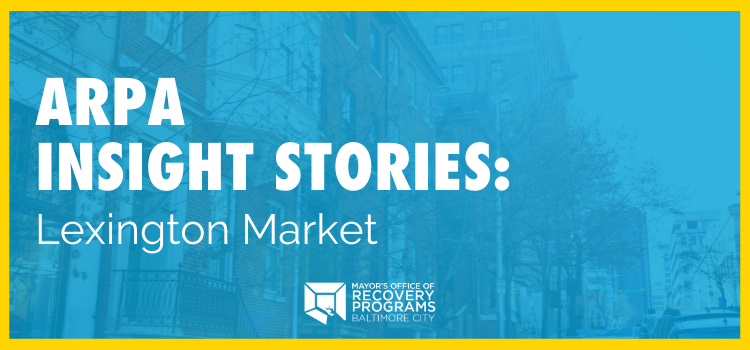ARPA Insight Stories: Lexington Market
Thursday Apr 14th, 2022

ARPA Impact Stories: Lexington Market
In March 2022, Mayor Brandon M. Scott allocated $4.9 million of Baltimore’s American Rescue Plan Act (ARPA) funding to complete the redevelopment of Lexington Market, for the 45+ diverse merchants who will call the new market home. The new merchant mix will increase minority-owned businesses and women-owned businesses. The market’s redevelopment marks a new era for the nearly 240-year-old institution.
Construction for the new and improved Lexington Market was halted due to the COVID-19 public health emergency. As the market prepared to continue with reopening plans, the cost of materials and labor dramatically increased. Without additional financial resources, these costs would be passed down to vendors - impacting minority vendor participation in the market.
Baltimore's small businesses have been resilient in enduring the challenges caused by the COVID-19 public health emergency, including supply chain shortages and increased costs of operation. ARPA funding will be used to support recovery and enhance resiliency for legacy and new vendors at Lexington Market and the surrounding community.
Meet Keiller Kyle of Ovenbird
Keiller Kyle opened Ovenbird Bakery to the public on June 17, 2020. Like other small business owners, they persisted through the unknowns of the yearly lockdown, employee shortages, and increasing safety measures for customers and staff. “Our business is a child of the pandemic and we are still only able to have one person through our doors at a time to ensure proper spacing to keep everyone safe,” Kyle said. “We have grown exponentially in the first two years of our business, and that growth has been despite COVID throwing curveballs at us.”
The ARPA funding has allowed vendors in the new Lexington Market to focus on other problems complicated by the COVID-19 public health emergency. Kyle said “Lowering the cost of entry to Lexington Market means everything to our business. We are in the midst of expanding our production facility while also growing our retail presence in the Market. We would not be able to do both of these things at the same time without the ARPA funds. Personally, knowing the Lexington Market folks are truly working for the benefit of the vendors allows me a lot more sleep at night.”
Meet Alex Kofman of Kofman’s Shoe Repair
A legacy vendor at Lexington Market, Kofman’s provides a level of craftsmanship and professionalism in a classic trade. They repair shoes, do custom-dye work, and make keys, among other things. Kofman’s Shoe Repair has been in Lexington Market since the 1930s.
The COVID-19 public health emergency has put businesses like Kofman’s Shoe Repair in “stand-by mode.” The store saw a 65% reduction in income, making just enough money to stay open. Alex Kofman, a fourth-generation cobbler and owner, is excited about moving into the new market. “The past two years have been exceedingly difficult, but if that’s the cost to pay to get to the proverbial light at the tunnel’s end, it will have been worth it!”
Meet DeShaun D. Scott of Hominy’s Kitchen
“If I had to sum it up in one word, it would be legacy,” said Scott. “Our main objective has always been to provide something tangible for our children to be able to carry on what we started.” Hominy Kitchen is a black-owned business that has been in Lexington Market since March 2021. Deshaun Scott’s provides a classic Southern cuisine with food bought fresh daily and made to order. He said the inability to plan was the most challenging part of the COVID-19 public health emergency. He looks forward to moving into the market and continuing to serve quality food to the people of Baltimore.
Meet Angela Chester-Johnson of PlumGood
Founded in 2011 by Angela Chester-Johnson, PlumGood specializes in ethically sourced spices and spice blends, dried and loose teas, delicious sauces and rubs, as well as spiced popcorn. Chester-Johnson has fond memories of coming to Lexington Market. "Joining the new Lexington Market is uber exciting. I love Baltimore and believe that the market will play an important role in the city center’s revitalization” said Chester-Johnson. “I am confident that the spices, sauces, and teas that we will sell at our stand, will flavor our customers' meals and raise their culinary and wellness IQs. Monetary support is key to small businesses regaining stability."
About the Mayor’s Office of Recovery Programs
The American Rescue Plan Act (ARPA) provided $641 million to the City of Baltimore in response to the COVID-19 public health emergency and its negative economic impacts. Mayor Brandon M. Scott has established the Mayor’s Office of Recovery Programs to transparently and effectively administer this funding on behalf of the City.
For the most up-to-date information regarding proposals, funded projects, and project progress visit our ARPA Reporting center at arp.baltimorecity.gov/dashboard.
